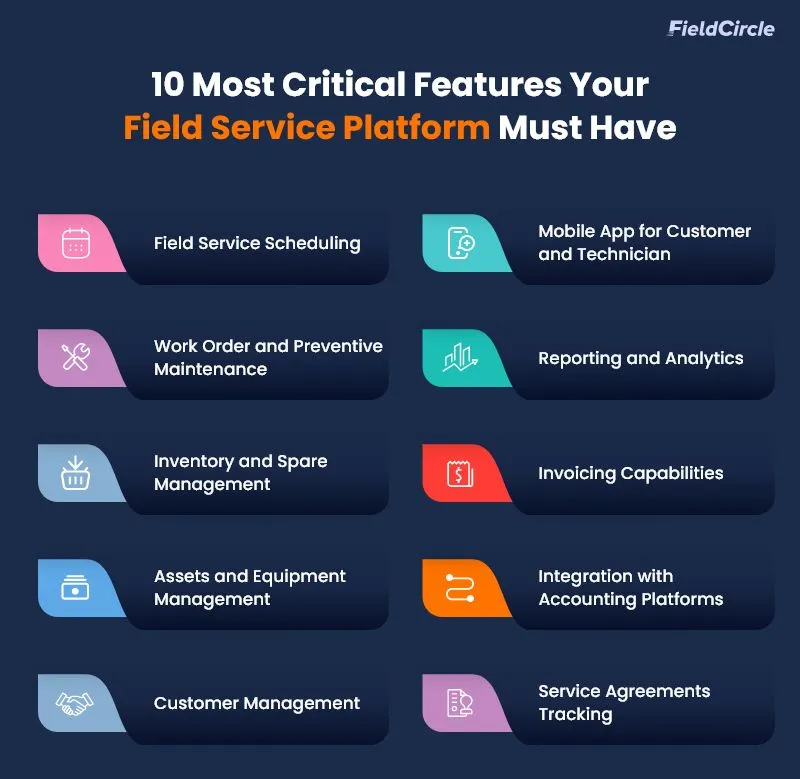10 Most Critical Features Your Field Service Platform Must Have

Businesses of all sizes are increasingly integrating Field Service Management software into their operations. This trend has led to a significant growth in the global market, which was valued at $4.819 billion in 2021 and is forecasted to reach $24,294 billion by 2030. Field Service Management Software serves as a valuable tool for businesses aiming to enhance customer service and organizational agility.
Field service includes a set of tasks, such as installation, maintenance, and repairing equipment post-sales. As field processes are integral to customer service, it must be managed in a way that leads to customer satisfaction, increased productivity, and high profitability. The mobile workforce and field service technicians play key roles in delivering effective solutions using this software. Being indispensable in asset-centric industries, offering a multitude of features designed to enhance operational efficiency, boost productivity, and elevate customer satisfaction. This software plays a pivotal role in managing post-sales tasks including installation, maintenance, and repairs, which are crucial for ensuring continued customer support and satisfaction. As field processes directly affect customer relations and business profitability, they must be handled with utmost efficiency.
Additionally, Field Service Management (FSM) software enables seamless customer interactions through a mobile app, allowing your company to effortlessly manage requests, monitor field technician availability, prioritize tasks, and enhance overall efficiency and productivity within your mobile field service operations.
In this blog, we will delve into the top 10 features and components of Field Service Management that we believe can streamline processes and significantly boost your organization’s profitability.
Here are the 10 most Critical Features Your Field Service Platform Must Have
- 1. Field Service Scheduling
- 2. Work Order and Preventive Maintenance Management
- 3. Inventory and Spare Management
- 4. Manage Assets and Equipment
- 5. Customer Management
- 6. Mobile App for Customer and Technician
- 7. Reporting and Analytics
- 8. Invoicing Capabilities – Simplifying Billing and Payments
- 9. Integration with Accounting Platforms
- 10. Keeping Track of Service Agreements
1. Field Service Scheduling
Field service scheduling is all about efficiently assigning the right technicians to the right jobs based on various factors like skills, availability, and proximity to the job site. For instance, a telecommunications company might use FSM software to schedule appointments for technicians to install or repair equipment at customer locations. When a customer reports an issue, the system automatically assigns the nearest technician with the necessary skills to address the problem, ensuring prompt service and optimal resource utilization.
Your field service platform should boast advanced scheduling functionalities enabling precise allocation of technicians to respective jobs, considering their skills, availability, and proximity to the job site. Once the schedule is prepared, technicians need to be promptly informed. This process entails meticulous consideration of various factors, such as client availability, professional expertise, and equipment accessibility.
There are two primary methods for scheduling field operation platforms: manual and automatic scheduling. In manual scheduling, a dispatcher or scheduler manually creates the schedule. This method can be time-consuming and prone to errors, as it requires continuous communication between dispatchers and technicians. On the other hand, automatic scheduling utilizes the solution to generate the schedule automatically. This approach is more efficient and accurate, as it automatically factors in all necessary considerations without the need for manual intervention.
2. Work Order and Preventive Maintenance Management
Work order and preventive maintenance management involve creating, assigning, and tracking tasks related to equipment maintenance and repairs. For example, a manufacturing plant might use FSM software to schedule routine maintenance checks for production machinery. By proactively scheduling maintenance tasks and addressing issues before they escalate, the plant can minimize downtime and maintain smooth operations.
By investing in a tool with work oder and preventative maintenance management features, you can keep your business running smoothly and minimize costly downtime. With the help of field service management features, you can schedule repair orders, keep track of preventive maintenance chores, and track work orders.
3. Inventory and Spare Management
Inventory and spare management entail tracking and managing the stock of spare parts and consumables needed for equipment maintenance and repairs. For instance, a transportation company might use FSM software to monitor the inventory of spare parts for its fleet of vehicles. When a technician identifies a worn-out part during a maintenance inspection, they can quickly check the inventory status and request a replacement if needed, ensuring that repairs can be completed without delay.
Utilizing these FSM features enables you to effectively monitor tools, equipment, and consumables within service management. This data proves invaluable for companies, facilitating the ordering of new consumables and the planning of preventive maintenance tasks. Moreover, service solutions can accurately track the status of each spare part, simplifying the identification of items in use and those available for sale. By streamlining inventory management, service management solutions aid firms in saving both time and money.
4. Manage Assets and Equipment
Managing assets and equipment involves tracking the location, usage, and maintenance history of company assets. For example, a construction company might use FSM software to monitor the utilization and maintenance schedules of heavy machinery like excavators and bulldozers. By effectively managing assets, the company can optimize resource allocation, minimize downtime, and extend the lifespan of expensive equipment.
Effectively managing assets and equipment is imperative for businesses in today’s dynamic landscape. As businesses evolve and become more intricate, the need for a platform capable of tracking and overseeing all company assets becomes ever more crucial. This is precisely where field support management steps in. Field service management software aids businesses in effectively managing their assets and equipment. By meticulously tracking the location of each asset, you can guarantee that all acquisitions are accurately recorded and adequately maintained. Moreover, the software’s features facilitate scheduling preventive maintenance tasks and monitoring repair histories. Leveraging this information can enhance the efficiency of your service operation and mitigate the risk of expensive downtime.
5. Customer Management
Customer management is about maintaining comprehensive customer profiles and tracking interactions to deliver personalized service experiences. For instance, a home maintenance services company might use FSM software to keep track of customer contact information, service history, and preferences. When a customer requests a service, the system automatically assigns the job to a qualified technician. It provides the customer with real-time updates on the appointment status, enhancing communication and satisfaction.
Effective customer management is essential for the success of any business. Fundamental features of field software assist companies in maintaining comprehensive customer records and delivering optimal service.
FSM typically encompasses functionalities such as customer profiles, appointment scheduling, and automated reminders. This includes storing contact information, service histories, and preferences, which significantly enhances customer service by ensuring appointment adherence and keeping customers informed of upcoming benefits. These capabilities play a critical role in driving field service customer engagement, enabling businesses to deliver personalized experiences and maintain consistent communication throughout the service lifecycle.
Furthermore, service management tools facilitate the tracking of customer feedback, enabling companies to refine their service offerings. By leveraging the platform, businesses can ensure continuous customer satisfaction and uphold high service standards.
6. Mobile App for Customer and Technician
A mobile app for both customers and technicians allows for convenient access to service-related information and communication. This capability is a key aspect of field service mobility, which empowers organizations to streamline operations by connecting field personnel with real-time data. For example, an appliance repair company might provide customers with a mobile app to request service appointments, track job statuses, and provide feedback on service quality. Technicians can use the app to view their schedules, navigate to job sites, and update job statuses, improving efficiency and communication for both parties.
The integration of mobile apps for customers and technicians in field operations management is revolutionizing business operations, fostering a more efficient and productive workflow for all stakeholders. Moreover, the app serves as a convenient platform for customers and technicians to communicate, exchange information, and resolve issues promptly—addressing one of the most critical aspects of communication in field service. This technology enables companies to cut costs, improve collaboration, and deliver an exceptional overall customer experience.
7. Reporting and Analytics
Reporting and analytics involve generating insights from data to optimize field service operations. For example, a logistics company might use FSM software to analyze key performance metrics like on-time delivery rates and fuel consumption. By identifying trends and areas for improvement, the company can implement strategies to enhance efficiency and reduce costs, ultimately improving overall performance.
Field service management typically encompasses a range of reports, including work order reports, customer satisfaction reports, and technician productivity reports. These reports unveil field service trends and provide insights into improving field operations. Additionally, the solution typically features a dashboard that consolidates essential data, allowing users to access critical information efficiently from a single interface.
It is an integral component of service management, enabling businesses to monitor key performance indicators and pinpoint areas requiring operational enhancement. Furthermore, service management reporting facilitates enterprises’ benchmarking of their performance against industry competitors.
8. Invoicing Capabilities – Simplifying Billing and Payments
Invoicing capabilities streamline the billing process by automating the generation of invoices for services rendered. For example, an HVAC company might use FSM software to automatically calculate the cost of a service based on labor and materials used and generate an invoice for the customer. By simplifying billing and payment processes, the company can improve cash flow and reduce administrative overhead.
Generating and dispatching invoices directly from the platform is an indispensable feature for your field service. This streamlines processes and reduces administrative burdens. A field service management solution equipped with invoicing capabilities empowers your team to produce precise, polished invoices based on completed tasks, service contracts, or utilized spare parts.
Furthermore, real-time invoicing accelerates payment processing, guaranteeing prompt payments and enhancing cash flow. Seek out a platform offering customizable invoice templates, seamless payment gateway integration, and automated reminders for outstanding balances.
9. Integration with Accounting Platforms
Integration with accounting platforms allows for seamless synchronization of financial data between systems. For example, a construction equipment rental company might use FSM software that integrates with its accounting software to record rental transactions and track revenue and expenses automatically. By eliminating manual data entry and ensuring data accuracy, the company can streamline financial processes and improve decision-making.
Effective financial management is paramount for every business, highlighting the essential role of integration with accounting platforms. A field service platform that seamlessly integrates with widely used accounting solutions like QuickBooks or Xero can greatly streamline the reconciliation of financial data, saving substantial time and effort.
This integration facilitates the automatic synchronization of data between the field service platform and your accounting solution, eliminating the necessity for manual data entry. Consequently, it ensures the accuracy and currency of financial records, mitigates the risk of errors, and simplifies the process of financial reporting.
10. Keeping Track of Service Agreements
Managing service agreements involves managing contracts and agreements with customers, including SLAs and renewal dates. Contract management is pivotal for service-oriented enterprises that rely on recurring contracts or service agreements. An effective field service platform should enable seamless creation and management of service contracts, encompassing the definition of contract terms, service level agreements (SLAs), and renewal dates.
For example, a managed IT services company might use FSM software to track service agreements with its clients and automatically generate service tickets for covered incidents. By proactively managing service agreements, the company can ensure compliance and deliver on contractual obligations, enhancing customer satisfaction.
Utilizing contract management features, you can establish automated notifications for contract expirations and renewals, guaranteeing that your field service team remains informed and proactive in seizing opportunities to upsell or renew contracts with current clients. This proactive approach not only fosters strong customer relationships but also maximizes revenue potential.


